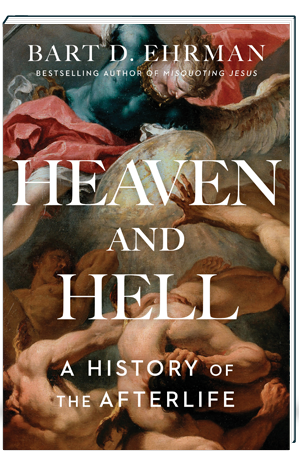
Heaven and Hell: A History of the Afterlife
By Bart D. Ehrman
Publisher: Simon & Schuster
Publication Date: March 31, 2020
Language: English
ISBN-10: 1501136739
ISBN-13: 978-1501136733
Format: Hardcover, 352pp
Dimensions: 6 x 9 Inches
Affiliate Disclaimer: We may earn commissions on products you purchase through this page at no additional cost to you. Thank you for supporting our site!
REVIEWS
“Ehrman’s eloquent understanding of how death is viewed through many spiritual traditions is scintillating, fresh, and will appeal to scholars and lay readers alike.”
– Publisher’s Weekly
“Ehrman (religious studies, Univ. of North Carolina at Chapel Hill, Misquoting Jesus) is a skilled and erudite revealer of patterns and oddities found in the bible. Here, he turns his talents to questions of the afterlife. It’s rare to encounter something fresh and new about this topic, but Ehrman has a gift for distilling new findings in biblical scholarship and conveying these ideas in accessible ways. He explicates the evolution in our understanding of ultimate justice and relates the concept of an eternal abode to the enigma of mind-body dualism. Ehrman’s account may lead readers to reconsider some cherished preconceptions. Expect delightful, informative examinations of ancient ideas about heaven and hell; ideas that have evolved as human needs and desires have also evolved. VERDICT Recommended for those who appreciate popular approaches to religious studies and anyone curious about their final destination.—Denis Frias, Mississauga Lib. Syst., Ont.”
– Library Journal
“In this enlightening survey of human understanding of the afterlife, Ehrman (How Jesus Became God), professor of religious studies at UNC Chapel Hill, offers a persuasive analysis of how the current evangelical Christian understanding of eternal life and eternal damnation developed as well as a well-reasoned critique of that perspective. Ehrman begins with the Epic of Gilgamesh (written around 2100 BCE), continues through the ancient Greeks, and covers canonical and extracanonical Hebrew and Christian texts as he details humanity’s long-standing preoccupation with death and the fear of what follows. He documents wide-ranging theories: Homer’s vision of a bleak, dreary existence in Hades; Virgil’s belief in hellish torments and heavenly glories; Plato’s position on the soul’s immortality; the ancient Israelites’ view that death is the end, but not to be feared; and later Jewish belief in resurrection and a Day of Judgment. Calling into question many evangelical notions of damnation, Ehrman posits that neither Jesus, the apostle Paul, nor the author of Revelation believed in hell. Rather, the punishment for sin was annihilation, while the righteous received everlasting life . Ehrman’s eloquent understanding of how death is viewed through many spiritual traditions is scintillating, fresh, and will appeal to scholars and lay readers alike. (Mar.) ”
—Publishers Review
DESCRIPTION
A New York Times bestselling historian of early Christianity takes on two of the most gripping questions of human existence: where did the ideas of heaven and hell come from, and why do they endure?
What happens when we die? A recent Pew Research poll showed that 72% of Americans believe in a literal heaven, 58% in a literal hell. Most people who hold these beliefs are Christian and assume they are the age-old teachings of the Bible. But eternal rewards and punishments are found nowhere in the Old Testament and are not what Jesus or his disciples taught.
So where did the ideas come from?
In clear and compelling terms, Bart Ehrman recounts the long history of the afterlife, ranging from The Epic of Gilgamesh up to the writings of Augustine, focusing especially on the teachings of Jesus and his early followers. He discusses ancient guided tours of heaven and hell, in which a living person observes the sublime blessings of heaven for those who are saved and the horrifying torments of hell for the damned. Some of these accounts take the form of near death experiences, the oldest on record, with intriguing similarities to those reported today.
One of Ehrman’s startling conclusions is that there never was a single Greek, Jewish, or Christian understanding of the afterlife, but numerous competing views. Moreover, these views did not come from nowhere; they were intimately connected with the social, cultural, and historical worlds out of which they emerged. Only later, in the early Christian centuries, did they develop into the notions of eternal bliss or damnation widely accepted today.
As a historian, Ehrman obviously cannot provide a definitive answer to the question of what happens after death. In Heaven and Hell, he does the next best thing: by helping us reflect on where our ideas of the afterlife come from, he assures us that even if there may be something to hope for when we die, there is certainly nothing to fear.
